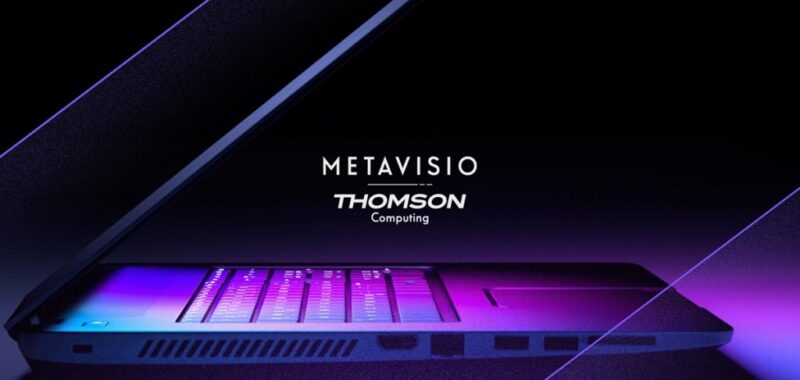Metavisio and its subsidiary Thomson Computing have unveiled what they call the first Web3 laptop, engineered from the ground up for native Web3 experiences.
Paris-based Thomson Computing’s designers have merged cutting-edge financial and cryptographic technologies to develop secure Web3-native hardware built on a proprietary operating system.
With this release, Metavisio and Thomson Computing said they are set to become the first fully vertically integrated provider of both hardware and software for the Web3 era. The technology and initial platform has been developed over the last 3.5 years.
Metavision and Thomson Computing have recently raised 50 million euros ($52.5 million) in SAFE financing from American AI and Hardware Investments to fuel its growth in blockchain technology and hardware.
Based in France, Metavisio and its Thomson Computing brand are producing a wide range of consumer electronic products, including televisions, audio/visual devices, and telephony. In 2013, Metavisio established Thomson Computing as a dedicated computing branch focused on laptops and tablets, offering high-quality products designed in Europe.
Available in over 52 countries, the company has sold more than 3 million devices worldwide to date through 16,000+ physical points of sale, and leads the French entry segment with 53% market share.
The details

The world’s first Web3-enabled laptop will combine Thomson Computing system hardware with a state-of-the-art integrated cold storage wallet and io.finnet’s trustless Multi-Party Computation (tMPC) software, offering enhanced security with no single point of failure.
With more than $1.7 billion stolen from centralized exchanges in 2023 and $3.8 billion in 2022, integrated cold storage will enable users to take control of their crypto custody and avoid placing their digital wealth
at risk.
The Thomson Computing’s Web3 laptops will feature a next-generation operating system that seamlessly integrates Web3 technologies with traditional computing, transforming how users interact with decentralized networks. These laptops will blend conventional OS functions with decentralized, user-controlled technology, offering powerful features like dApp integration, Thomson Computing wallet, and an underlying token ecosystem.
Users can earn rewards through resource sharing and other actions while enjoying enhanced security with private satellite internet. This groundbreaking device combines traditional computing power with blockchain-native features, including integrated cold storage wallets and a proprietary Web3 operating system.
Stephan Français, founder and CEO of Metavisio Thomson Computing, said in a statement, “Metavisio- Thomson Computing has a rich history of French excellence, quality, and innovation, raising the standards of what personal electronic devices can be. With the world’s first Web3 laptop, we will deliver much more than just a computer; it’s a unified platform for Web3 that does not compromise on hardware or security. This is something the industry fundamentally needs to onboard the next billion users to Web3.”

With a giant global network of partners including Walmart, Amazon, Nvidia, Carrefour, Microsoft, Groupon, China SatNet, and Intel, Metavisio-Thomson Computing’s move to Web3 comes at a time of opportunity.
The global Web3 market size is estimated at $5.7 billion in 2024 with a CAGR of 13.1% from 2025 to 2030. Within this booming sector, global digital asset custody was estimated at $553.82 billion in 2023 and is projected to reach over $3742.82 billion by 2032 at a CAGR of 23.65%.
With the authentication and digital identity markets on a similar trajectory, the time is ripe for the first fully vertically integrated web3-native hardware and software provider to capitalize on these trends.
“The world’s first Web3 laptop isn’t just a device,” Français added. “It’s a platform that redefines what computing can achieve in the decentralized era.”
I asked how flexible the solution is when it comes to enabling users to install a wallet of their choice. They said it would be done through dApp (a decentralized app) and it is based on the signing curve of the chain. The Web3 OS V 1.0 will be deployed with the retail wallet (and available for enterprises as well) in the first quarter of 2025. For the computer, the team said it will need to define the composition and timing to produce a prototype.
I also asked how many blockchains does it natively support. The team said it has all EVM + Bitcoin + XRP + TAO and more as it is adding them as dApp (such as Solana etc.). The team has integrated the two most important signing curves which open quick blockchain integration.
Thomson Computing has 40 employees, while the parent Metavisio has 29. The laptop is intended to be sold globally. The first price of the laptop would be from 499€ to 2000€.
Source link

